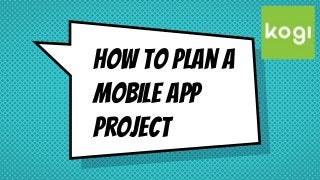
How to Plan a Mobile App Project (Step-by-Step Guide)
- 1. How to plan a mobile app project
- 2. How to Plan a Mobile App Project Checklist × Setting up goals × Brainstorm your app by sketching × Market research × Know your user-base × Come up with wireframes × Do you need a backend? If yes plan! × Decide on what technologies to use × Test your prototype × Think MVP
- 3. 1 – Setting up goals Your first step should be to have a clear goal in mind before starting any development work. What problems are you trying to solve? What are your apps core features? What are you trying to achieve with your app? Are you planning to make money or setup app monetization? These are just some of the questions you should be asking yourself while defining your goals and planning your app out. Defining clear goals early on will help you get to your end result faster.
- 4. 2 – Brainstorm & sketching Sketching your app out will give you an idea about what your app will look like and how your pages will be linking to each other. It also lets you see if there are dead links or flaws on user experience and if you can fit all features into the menu system. These sketches will be the early blueprints of your app and will lay the foundation for your future interface and structure of your application.
- 5. George R. Moskoff Founding Consultant at APG Consulting “The biggest sign of an impending disaster is the lack of a business case for the development effort. I’ve seen this over and over: someone gets an idea for an app and heads off to get it coded. No research on whether the design or the niche is in need of such an app. The owner will end up with an app that “sits on the shelf” and a bad taste in his mouth from the $30K he spent to get the thing built.” 3 - Market research
- 6. 4 - Know your user-base You need to figure out early on who your audience is. Who is more likely to download your app? Who are you targeting with your app? With this information, you can then create an effective marketing strategy. Once you know exactly who your audience is then you can run targeted paid campaigns through social media or find blogs/forums where your user base spend time and target them on those channels.
- 7. 5 - Come up with wireframes Simply put Wireframing is creating mockups/prototypes of your app. The good news is there a lot of free wireframing tools out there to create an app mockup. Once you have the wireframes ready you can use them as a roadmap to understand the connection between each screen and how the user can navigate through your app. Having your wireframes ready will also help you to get an accurate time and cost estimate from a mobile app development agency.
- 8. 6 – Do you need a backend? If yes plan! This is the stage where your developer will have to set up servers, databases, APIs, and storage solutions. Not all apps require a backend so if you have a basic app without the need for a backend, simply skip this stage. If your app requires a backend though you should plan it out. If you are not technical simply ask your developer or development agency to do all the planning for you.
- 9. 7 – Decide on what technologies to use There are a couple of technologies to choose from when it comes to mobile app development like Swift, Objective-C, Java, and Phone Gap. Talk to an expert and see which technology suits your goals best.
- 10. Once you have your prototype share it with friends and family, ask them to test your mockup and give you honest feedback. It is very important to test every single scenario on the app to see if there are design flaws. Make sure there are no dead ends and your screens are all linked to each other. The goal is to concretize your app concept before it goes into the design process! Once you start designing, it is much harder to change things around. The clearer the prototype from the start, the better. 8 - Test your prototype
- 11. 9 - Think mvp Minimum Viable Product is an appreneurs best friend. Don’t try to tackle the whole problem at once. Come up with a stripped down version of your app to test the markets and validate your idea before investing in a full mobile product. This will also let you enter into the market quicker by cutting your development time and costs. Once you validate your app idea and start generating some interest you can always add more functionality and update your app based on early user feedback.
- 12. Kogi mobile Mobile App Development House www.kogimobile.com contact@kogimobile.com
